IN TRACK AND FIELD, tenths (and even hundredths) of a second can make or break a race. Performance depends on extremely precise measurements and time rules all. So it makes sense that luxury watch brands would look to those athletes as natural billboards, placing their timepieces on the wrists of some of the sport’s top performers. When Noah Lyles, the fastest man in the world, settled into the blocks for the 200-metre finals at the U.S. Olympic Trials in June, 4.5 million viewers tuning in via NBC and Peacock could see the glint of the sun off what appeared to be a $50,000 Omega watch.
Wearing this type of timepiece during a 19.53-second sprint is clearly a flex, since “there’s no performance reason for [these athletes] to wear luxury watches,” explains Aaron Rapf, the founder and CEO of Advantage Sports Marketing Group, a sports agency that connects brands with athletes. Runners are no stranger to pricy performance watches (a high-end Garmin can cost upwards of $900), and luxury watch companies are increasingly aligned with elite runners to “connect their company values to the sports landscape – which is one of the last bastions of true culture,” he adds. “If you want to be in a moment where you attract millions of people’s eyeballs at one time, it’s sports.”
These race day cameos are part of a more subtle approach to marketing, says Pierre-Loïc Assayag, CEO and co-founder of Traackr, an influencer marketing software company. “In the past, luxury brands were more focused on the product and the luxury associated with that product,” he says. “Now, these companies are taking the top athletes and putting them in front of their target audience, or one close to it, to demonstrate by proximity that ‘we are the precision brand’ or ‘we are the endurance brand.”
The kind of maneuvering uses a third party – one that’s fast, flashy, and accomplishing amazing feats – to craft an image the brand wants audiences to respond to. And by choosing athletes as brand champions, companies deftly align themselves with the hallmarks of high performance: precision, prestige, innovation, exclusivity, heritage, and craftsmanship.
In the past, those buzzwords were more likely to call to mind country club-esque activities (think: tennis or horseback riding) or auto racing, where the traditional consumer has been very upper class, living a high-cost lifestyle. But as culture skews more towards sport, health, and wellness, leaning into the popularity of running opens companies up to a new class of consumers, says Jessica Quillin, a luxury fashion brand and content strategist. “Track and field seems more accessible, because even though these athletes are performing at a super elevated level, anyone can go out and run,” she explains.
By association, watches become a more accessible form of wearable luxury. You may not wear one to train or on race day like the elite, sponsored athletes, but a sporty aesthetic can translate into your everyday life; post-run, you can still swap your COROS smartwatch for a sleek, sporty timepiece from a brand like Omega (which happens to sponsor the Diamond League, an annual series of pro track and field competitions). And though you may not be ready to buy a five-figure watch now, these companies are playing the long game; by connecting themselves with major players in sport, they’re hoping to build brand recognition and loyalty among potential future customers.
The watch brands Olympic runners are wearing
For those looking to upgrade their Garmin – now or as a future reward for finally achieving that personal best – these are a few of the luxury watches your favourite track and field stars have been sporting.
Hublot
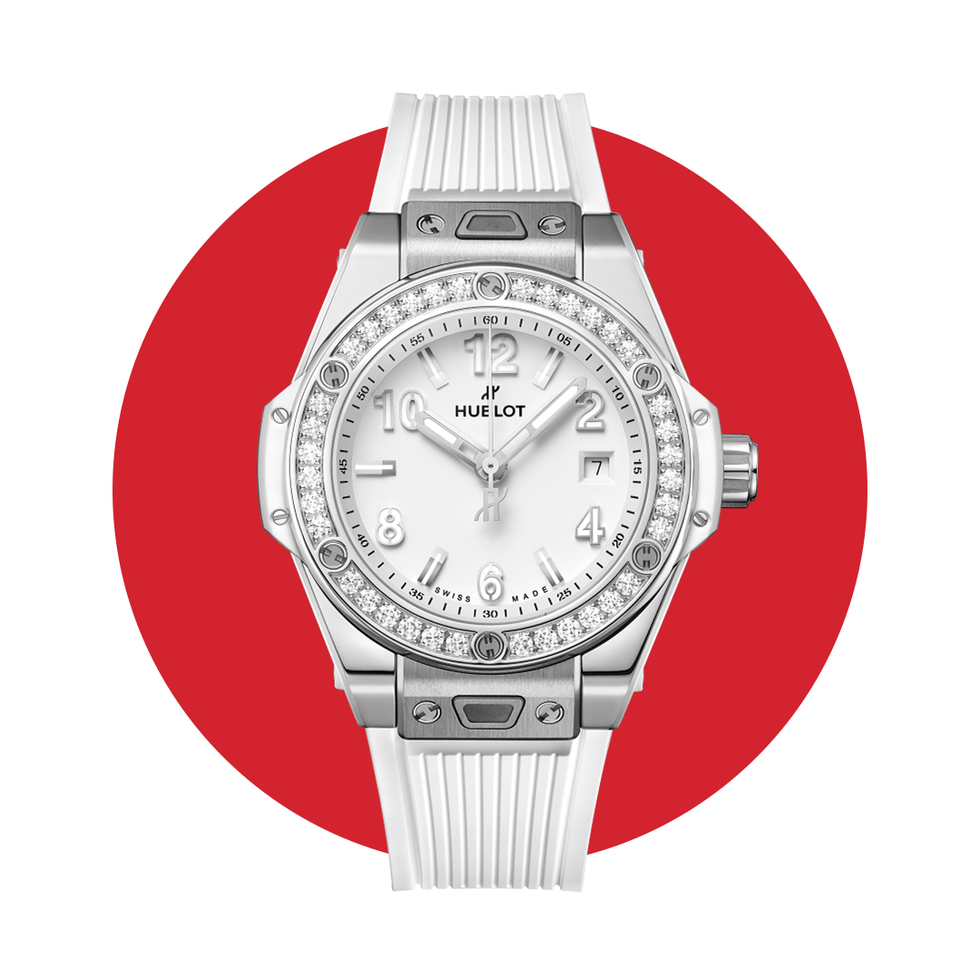
Sprinter Dina Asher-Smith is the fastest British woman on record, with two Olympic bronze medals from the 4 x 100-metre relay to her name. She’s also no stranger to luxury partnerships, having previously modelled for Louis Vuitton, Valentino, and Off-White, and has been working with Hublot since 2018. Asher-Smith has promoted a variation on Hublot’s flagship model, the Big Bang One Click, which starts at $14,200. Its smaller face was designed for slimmer wrists, and uses the brand’s patented “One Click” fastening system so wearers can swap out the straps for other colours or materials. The sporty, semi-skeletonized hands balance out flashiness of the diamonds on the bezel, and a self-winding caliber packs plenty of power into the compact timepiece.
Tag Heuer
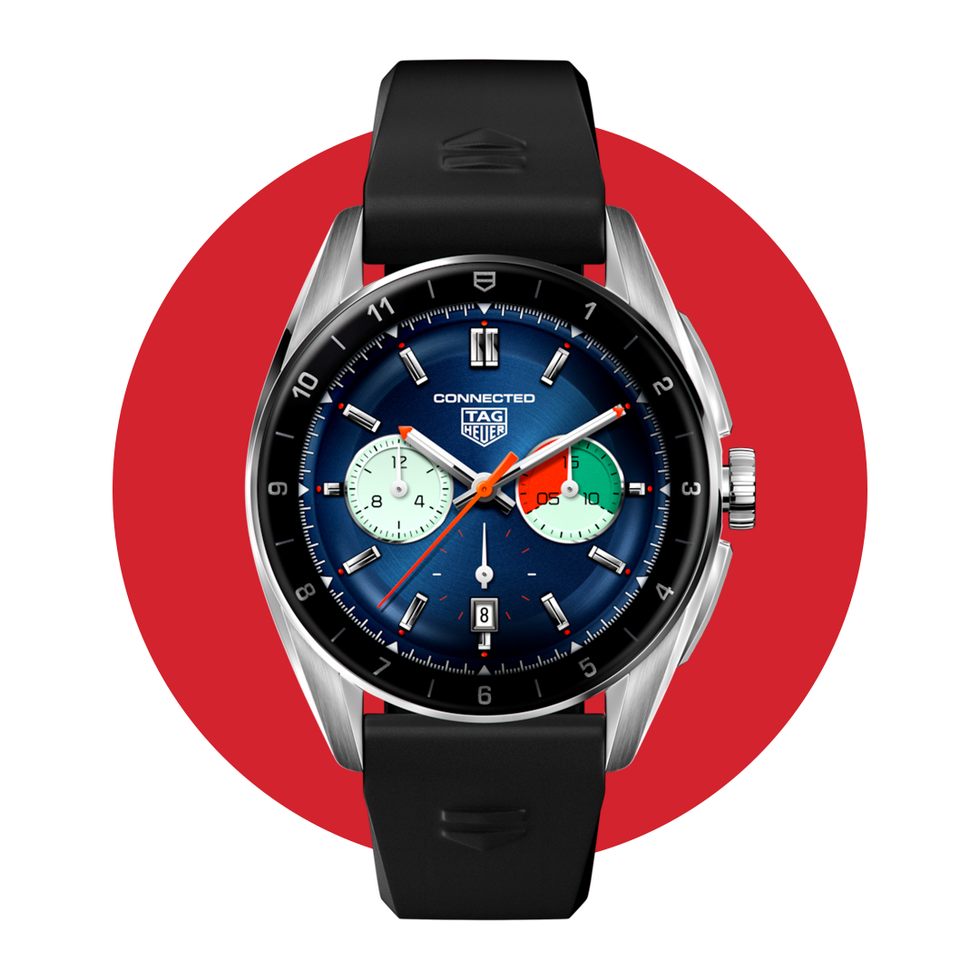
Two-time Olympic gold medalist Sydney McLaughlin-Levrone, who is representing Team USA in Paris again after breaking her own World Record in the 400-metre hurdles in June, has been sponsored by Tag Heuer since 2021. Tag Heuer is often considered the Cadillac of luxury watches, and McLaughlin-Levrone’s preferred watch, the Connected Calibre E4, is closest to the average runner’s GPS smartwatch: it operates on Wear OS by Google; has a 1.28-inch AMOLED display with crisp resolution; houses a heart rate sensor, barometer, and compass; and holds a 24-hour charge, including a one-hour sports session. The basic model, which includes a rubber strap, starts at $2,100.
Longines
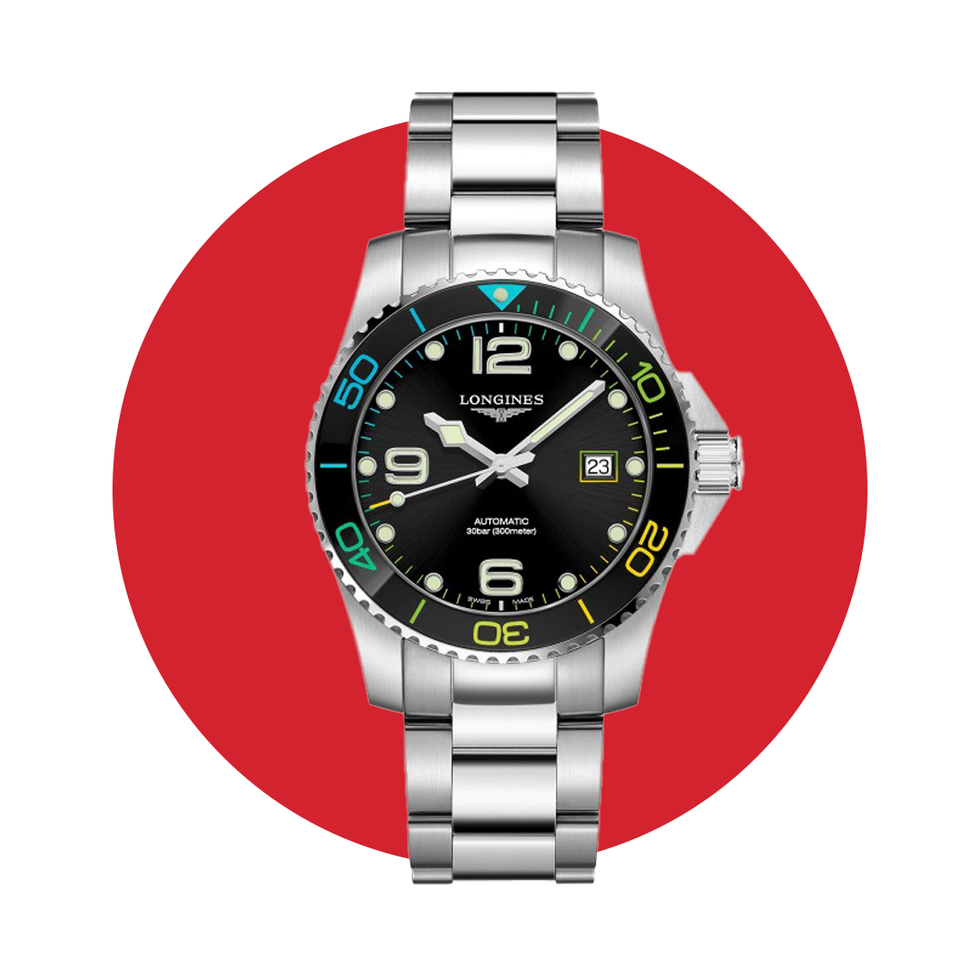
Olympic bronze medallist Josh Kerr is a double World Champion – in the 1,500-metre and 3,000-metre – which made him a natural representative for Swiss watch brand Longines, the official partner and timekeeper of the 2022 Commonwealth Games in Birmingham. Kerr, who is not currently working with Longines, recently ran a 3:45.34 in the Bowerman Mile, a historic and prestigious race held annually at the Prefontaine Classic in Eugene, OR, to set a new world-leading time in the event and a new British record. Back in 2022, Kerr wore the-limited edition HydroConquest XXII Commonwealth Games, a sporty steel dive watch with an automatic caliber, or engine, one-directional ceramic bezel, luminescent indices and hands, and an anti-reflective coating for crystal clear readability in any situation.
Omega
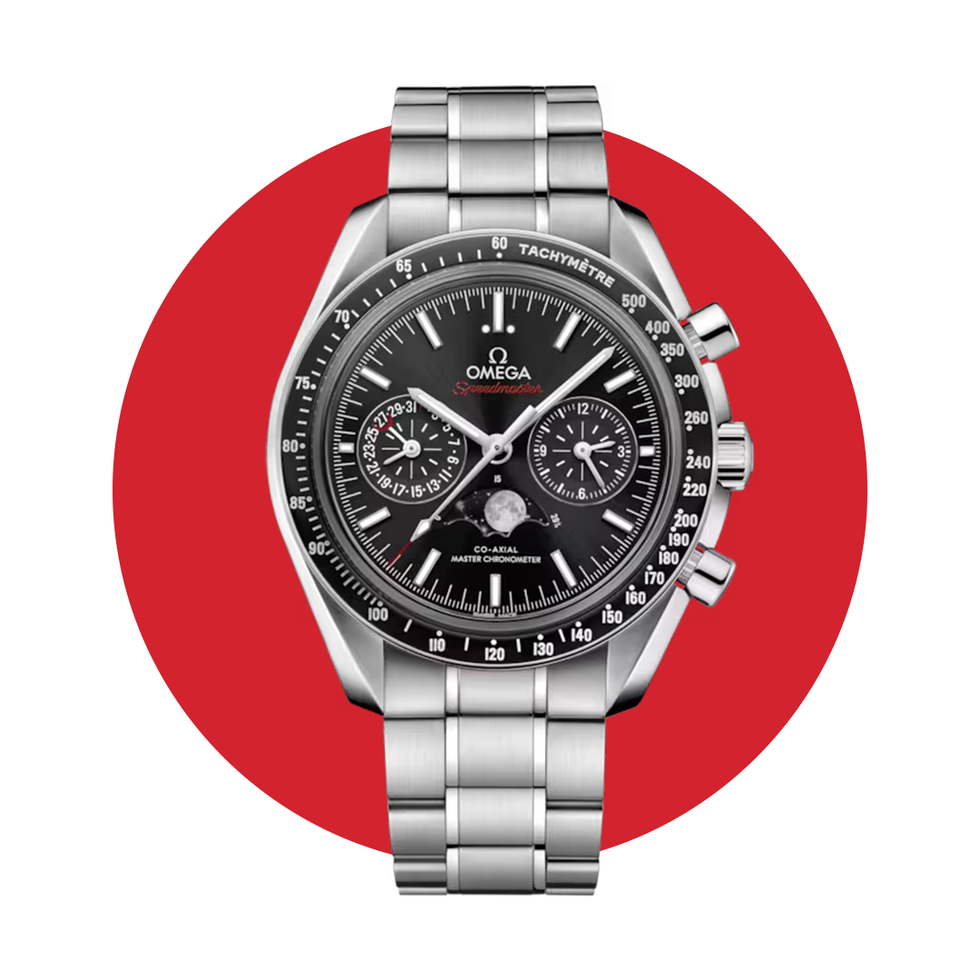
In addition to their Paris 2024 partnership, Omega is the official sponsor of the Diamond League (an annual series of elite track and field competitions) and counts Noah Lyles – one of the biggest personalities in track and field – as an ambassador. Lyles, who earned a bronze medal in the 200-metre race at the 2020 Tokyo Games and has his sights on breaking Usain Bolt’s records in the 100- and 200-metre races, wears Omega’s iconic Speedmaster Moonphase. This style was introduced in the 1980s, but the latest model – an oversized, steel-on-steel timepiece – was the first to earn a Master Chronometer certification thanks to a self-winding engine designed to withstand temperature fluctuations, water immersion, and electromagnetic frequencies. The timepiece can also hold up to the shock that comes with covering 100 metres in less than 10 seconds (when it’s on Lyles’s wrist, at least).
Richard Mille
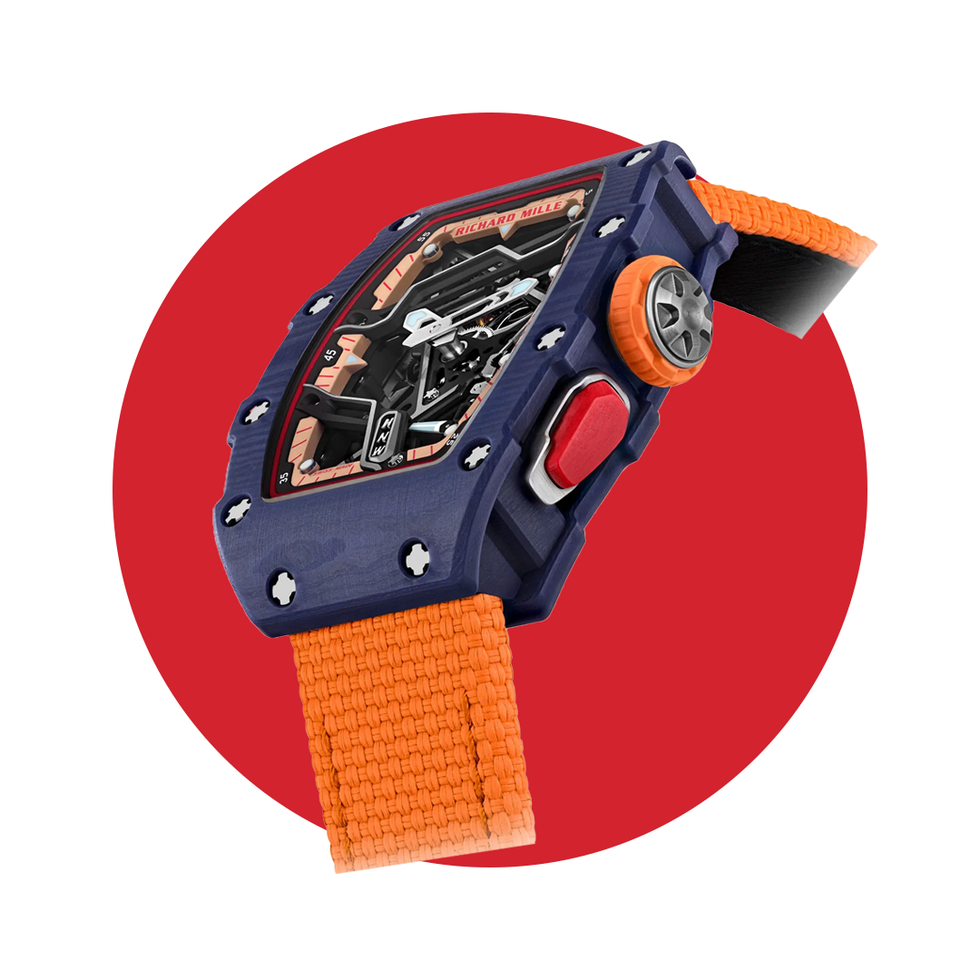
Ahead of what she said would be her final Olympic Games, Jamaican sprinter Shelly-Ann Fraser-Pryce – the most decorated athlete in 100-metre history –announced a partnership with Richard Mille. Fraser-Pryce wears the RM 07-04 Automatic Sport, the first women’s sports watch from the McLaren of watch brands, which retails at $185,000 (it’s the same watch Nafi Thiam, a double Olympic champion from Belgium, wore while setting a new pentathlon world record in 2023). The skeletonised aesthetic is housed in a compact case with rigid finishings for shock-resistance, and the button on the side allows the wearer to switch between winding, neutral, and time setting modes for the crown. While it would be nearly impossible to read during a race, at 36 grams it’s lighter than most standard running watches.
This article originally appeared on Men’s Health UK.
Related:















